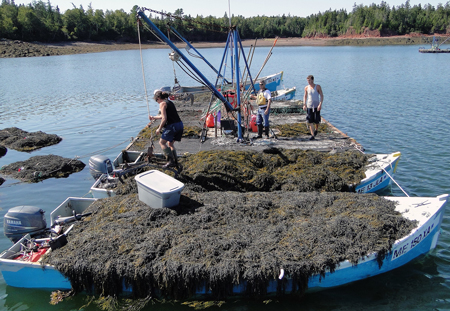
Unloading rockweed from Acadia Seaplants harvester boats, Cobscook Bay ca. 2012. Harvestors cut the rockweed in the intertidal zone using rake cutters over the side of open boats. Another platform is visible in the background upper right. The recent Maine state supreme court case on the intertidal zone has roots back to 1641 and 21st century ENGO backing. Chessie Crowe Gartmayer photo
Two Court Decisions Later, Questions Still Surround Rockweed
by Sarah Craighead Dedmon
It was a long wait for everyone. Land owners, rockweed harvesters, clammers and wormers watched closely as Ross v. Acadian Seaplants took three years to work its way through the courts. Finally, on March 28, the Maine Supreme Court issued a unanimous decision, saying “rockweed attached to and growing in the intertidal zone is the private property of the adjacent upland landowner.”
The Court’s decision pleased many with concerns about the ecological impacts of rockweed harvesting, and devastated those whose businesses are built on it.
“I think we’re stunned,” said Susan Domizi, founder and owner of Source, a company which makes animal and human supplements from Maine seaweeds, including rockweed. “All my life I thought it was the people of Maine who owned it. I thought it was in the public trust.”
Then on April 11, attorneys for Acadian Seaplants filed a Motion for Reconsideration with the Maine Supreme Court. “The effect of the judgment is automatically stayed when you file a motion for reconsideration,” said Gordon Smith, attorney for the plaintiffs.





